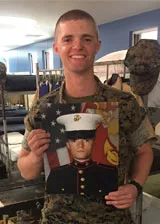After battling kidney disease for years, Bob Rockwell began preparing for what seemed like the inevitable: long-term dialysis. The chance of securing a life-saving kidney transplant was slim because of his rare blood type and complex medical history – his likelihood of finding the right kidney was 1 in 10,000.
“My wife, Donna Rockwell, and I had just accepted that dialysis was going to be my life from now on,” said Bob. He had already undergone a surgical procedure in his arm, an AV fistula creation, to prepare himself for long-term dialysis and the risks associated with it. In addition to heart disease, stroke and diabetes, dialysis is also associated with high cholesterol and damage to patients’ arteries. For Bob, this was a significant risk since he had already had bypasses in both of his legs due to peripheral vascular disease.
1 in 10,000
“There are about 100,000 people in the United States waiting for kidney transplants, and fewer than 20,000 are performed a year,” said his surgeon. “Getting on the kidney transplant waiting list is not easy for anyone, but Bob had obstacles that were more significant than most people.”
Bob is type B blood, which has the longest wait time of any blood type in this region — on average eight to 10 years. He was also 100% sensitized due to multiple blood transfusions in the past.
“That means his immune system had already been exposed to a huge number of molecules in other people’s blood, and as a result his body would reject a transplant from the vast majority of potential donors,” his surgeon said. “To put it into perspective, most people who are not sensitized can accept a kidney from almost any donor with a compatible blood type, but his likelihood of being able to accept a kidney from a potential donor was only 1 in 10,000.”
And even if a kidney was found, it was unclear if a transplant would be operatively possible because Bob’s arteries were so badly diseased. He would need to wait until Bob was in the operating room and under anesthesia with his blood vessels exposed to see if his arteries could be used for transplant.
No stranger to Tufts Medical Center
Bob has been coming to Tufts MC for 20 years now, so it was no question to seek care for his kidney disease from the Kidney Transplant Team last year.
“I had life-saving aorta surgery at Tufts MC in 1998. I came home, and I couldn’t stop thinking about how good the service was,” he said. “From the janitorial staff to every doctor I met, the care was amazing. I’ve never been to another hospital since.”
Bob was put on the kidney transplant waiting list, and the kidney allocation system in the United States thankfully allowed him to receive kidney offers from across the country, as compared to only local offers because he was so sensitized. However, he still had one major concern.
One thing more important than a kidney transplant

“I told the doctors that I could not have my kidney transplant the week of my son’s graduation from boot camp,” he said. “My son, Bobby, was completing his United States Marine Corps training at Parris Island in North Carolina, and the only way I wasn’t going was if I was dead.”
The chances that Bob would get a kidney, let alone only three weeks after he was put on the transplant waiting list, were almost nonexistent. Beating the odds again, Bob got the call he was waiting for a few days before graduation. Tufts MC found a kidney for him.
“I was really torn and conflicted—I knew this kidney would save my life, but I didn’t want to disappoint Bobby,” Bob said. “Donna eventually convinced me to take the kidney. Without her, this wouldn’t have happened and I’d still be dying.”
So, he picked up the phone to regretfully tell his son he would not make it to Parris Island.
“I called Bobby and told him I had good news and bad news,” Bob said. “The bad news was that I can’t make it to graduation, but the good news was that I got a kidney. He just said, ‘Dad, there’s no bad news.’”
A new kidney + a new start in life
Bob got to the hospital around 2:30 AM on the day of his surgery. His arteries passed the test and in just hours, Bob had a new kidney and was thriving. Two of his friends that were visiting said that he hadn’t looked that good in years, despite having just undergone major surgery.
“Bob was extremely lucky to receive a preemptive kidney transplant, meaning he got his transplant before ever going on dialysis,” his surgeon said. “The health benefits of this are dramatic — his transplant kidney has a high chance of still working in 10 years.”
With the help of all Bob’s team members: Dr. Jeffrey Cooper, Dr. Gennaro Carpininto, Dr. Nitender Goyal, Brian Bergeron, NP and Dan Migliozzi, Pharm.d, Bob’s health is now markedly improved. His kidney function is very good and continues to get better. The transplant likely added five more years to his life expectancy than had he gone on dialysis, according to his surgeon.
“What separates this hospital from all the other hospitals is the service,” Bob said. “All of the hospitals in Boston have skilled doctors, but only Tufts MC gives you this quality of care.”